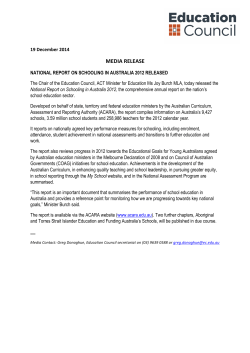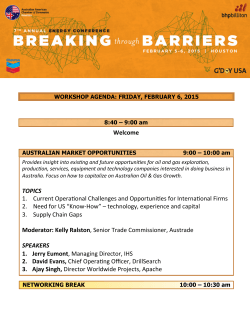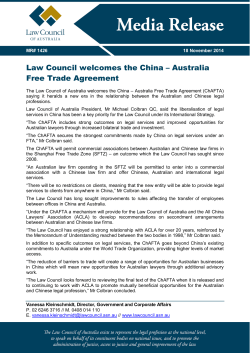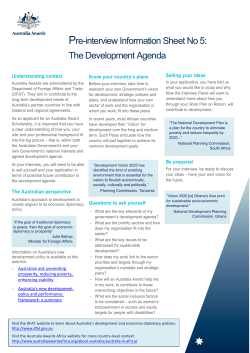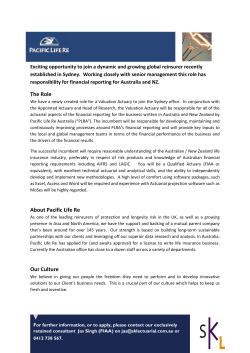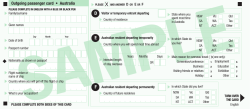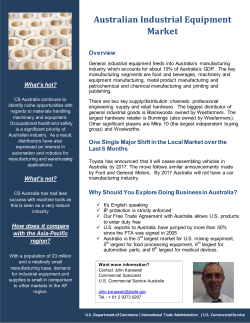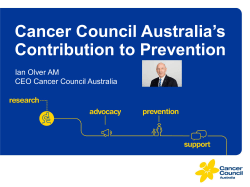
NEWSLETTER - ANFF ACT & WA Nodes
Australian National Fabrication Facility Ltd NEWSLETTER SUMMER 2015 In This Issue • Gene Therapy.........................................1 • US / Australia Joint Commission Meeting......1 • ANFF 2025 Future Capabilities Consultation.2 • Awards..................................................2 Making gene therapy accessible to the masses Inherited genetic disorders, cancer and viral infections such as HIV may all be treatable in the future thanks to the field of research called gene therapy. Given these issues, gene therapy is currently only being tested for the treatment of diseases that have no other cures. A major challenge with gene therapy is the risks associated with gene delivery. Normally, genes are delivered across a cell membrane by an engineered virus that is given to a patient. In 1999, 18 year old Jesse Gelsinger, who was undergoing gene therapy for a liver disorder, died after having a reaction to the engineered gene-carrying virus, stopping clinical trials in their tracks. Ryan Pawell, a PhD Student at the University of New South Wales, may have a better solution. Ryan is developing a microfluidic chip that replaces the need for an engineered virus and allows the cell to be engineered in an affordable and scalable manner. Device development and fabrication took place at the OptoFab (Bandwidth Foundry), New South Wales (UNSW), and South Australian (Uni of SA) nodes of ANFF. A less risky but very costly alternative has since evolved. It involves injecting cells into the patient that have been modified with the virus outside of the body. The cost of engineering these cells leads to gene therapies often costing in excess of $100,000 as they require expensive facilities that have limited throughput. His device also uses the Radulok™ tubing interface, developed at the SA Node, which allows simple high pressure connections to a microfluidic device that can be easily sterilised. (Video) Ryan has filed a provisional patent on his work and is currently looking to commercialise his invention, initially for HIV. ANFF looks forward to supporting Ryan commercialise his new venture that may disrupt the already substantial gene therapy industry. Image of the microfluidic chip used to deliver genes to cells, incorporating the ANFF-South Australia node’s Radulock™ tubing interface. Joint Commission Meeting on Science and Technology, 11-14 May 2015 Australian researchers are now invited to submit abstracts for inclusion in the program. ANFF, with the US Air Force Office of Scientific Research (AFOSR), will be hosting an Enabling Technologies Technical Exchange Meeting, as part of the US-Australia Joint Commission Meeting on Science and Technology. Abstracts should include a biography, be in word format, be no more than 1 page long, and identify a subtopic/s of relevance from the following list: It will be held in Arlington, Virginia (USA) from 11-14 May 2015. The purpose of the meeting is to explore and potentially build basic research collaborations between the US and Australia. The three over-arching technical thrusts are: US participation will include the Department of Defense, National Institutes of Health, National Science Foundation as well as academic researchers. • Materials Science, • Physics, and the • Biomedical Sciences. Efforts will be made to identify new areas of potential collaboration between Australian and US participants. Materials for extreme environments, low-density materials, materials chemistry, nanoelectronics, sensors, lasers, photonics, biophysics, human performance, biological effects of nanosystems, power and energy; and structural mechanics and prognosis. Abstract submission is via e-mail by 13 February to ed.scienceUS@dfat.gov.au. (More information) Providing micro and nano fabrication facilities for Australia’s researchers ANFF 2025 - Future Capabilities Consultation Nearly 3,000 users are forecast to access ANFF facilities to create new products, new companies, and world-class scientific advances this year. The ANFF Future Capabilities Consultation is an opportunity to examine the fabrication challenges that the Australian R&D community will tackle over the next 7 – 10 years. What will be the impact of this work? What will be the new scientific and commercial outcomes? What are the barriers to our success? All participants are welcome, including existing and future ANFF users from universities, publicly funded research agencies and industry. Come and tell us your vision for nanofabrication in Australia. Events will be held around Australia: - Canberra - 24 February - Adelaide - 26 February - Melbourne - 10 March - Sydney - 17 March - Brisbane & Perth dates TBA It will follow the themes identified in the 2012 National Nanotechnology Strategy released by the Australian Academy of Science. For venues and detailed program information, see the ANFF website. (Link) Awards ARC and NHMRC grants ANFF would like to congratulate researchers and staff on receiving the following awards: ANFF supports much of the research that is funded through the Australian Research Council (ARC), and National Health and Medical Research Council (NHMRC). - Prof Laurie Faraone, who became a fellow of the Institute of Electrical and Electronics Engineers (IEEE). - Prof Tanya Monro, who won the Australian Optical Society W.H. Beattie Steel Medal. - Prof Michael Withford, who became a fellow of the Optical Society (OSA). - Dr Ben Johnston, who won a Peak Professional prize at the Macquarie University Vice-Chancellor’s Excellence Awards. It is estimated that about 10% ARC Discovery grants fall within the ambit of nanotechnology research that ANFF supports. As an integral part of Australia’s research and innovation system, ANFF has prepared an advice document for 2016 ARC and NHMRC applicants. (Link) ANFF would like to wish its researchers the best of luck in with their applications for the 2016 round of funding. Around the Nodes ACT: Hosted the ANFF Annual Research Showcase. (Photos) Senator Zed Seselja, Senator for the Australian Capital Territory, officially launched one of the ACT Node’s flagship capabilities, the Metal Organic Chemical Vapour Deposition (MOCVD) laboratory. (More) Supporting Research & Innovation Commercial prototyping, hosting industry R&D operations, and contract research are all services that the ANFF provides beyond supporting cutting edge university research. Projects can be co-ordinated across the network taking advantage of the $200 m facility portfolio with support from world leaders in the following fabrication fields: • Micro and Nano electronics • Microfluidics and MEMS •Bio-nano applications • Advanced materials • Sensors and medical devices •Optics and photonics Innovative projects that have made a real difference to Australia can be found at www.anff.org.au Upcoming Events ANFF 2025 Community Consultations 24 February - Canberra 26 February - Adelaide 10 March - Melbourne 17 March - Sydney Brisbane and Perth TBA (More Information and Program) 29-30 April - Melbourne AusMedtech 2015 - Business Breakfast (More) ANU Pro Vice-Chancellor Prof Michael Cardrew-Hall, Senator Zed Seselja, and ACT Node Director Prof Chennupati Jagadish at the MOCVD Launch in Canberra. Western Australia: Hosted COMMAD 2014, the Conference on Optoelectronic and Microelectronic Materials & Devices, during December. As part of the conference the Node held an ANFF short course, Introduction to Nano-fabrication Technologies that was attended by over 50 researchers from around Australia. NSW: Commissioned its new Molecular Beam Epitaxy (MBE) lab consisting of 3 systems including two that are laser assisted. ANFF welcomes Pierette Michaux, Andrew See, Ute Schubert, Jeffrey Cheung, Prince Mathew and Felicity Tracy to the NSW Node team. Victoria: MCN released a new video on their mission and vision. (Link) Installed a four stack furnace, optical profilometer and an RF Microwave probe station. SA: ANFF-SA commissioned the remote access capability for their NanoCT tomography facility. Position Opening WA Node MEMS Engineer (More) Contact Us Dr Warren McKenzie - ANFF Business Development Manager Phone: 0400 059 509 Web: www.anff.org.au Email: info@anff.org.au Providing micro and nano fabrication facilities for Australia’s researchers
© Copyright 2025
